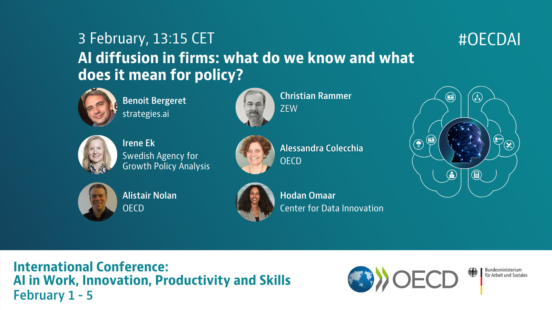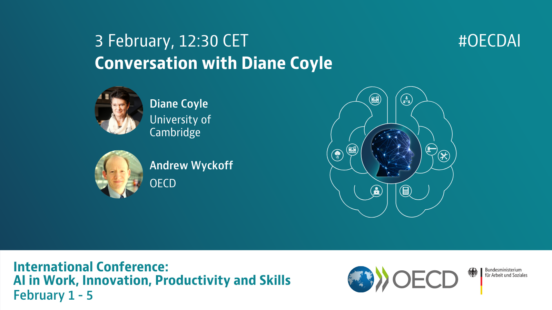The OECD programme on AI in Work, Innovation, Productivity and Skills (AI-WIPS) - with the support of Germany – analyses the impact of AI on the labour market, skills and social policy.
AI diffusion
AI’s impacts on productivity, growth, labour markets and society depend on the speed of development and diffusion of AI technologies. There are significant differences across firms, industries and countries in the adoption of AI, and some evidence suggests that take-up overall is slower than widely believed. Better understanding the many impacts of AI, when they might occurs, and the policies and other conditions that affect the diffusion process, is crucial to shaping appropriate policy.
OECD work on this topic focuses on:
- Business surveys of AI diffusion, including methodological challenges in survey design;
- The opportunities for new policy-relevant survey work;
- The challenges and enablers of AI adoption in firms;
- Policies to facilitate AI diffusion in the business sector; and,
- The skills bundles needed to work with AI.
Blog posts
More related postsVideos

AI diffusion in firms: what do we know and what does it mean for policy?
–
Conversation with Diane Coyle
–
Artificial intelligence is already transforming your life
–
AI adoption in industry and a new firm survey
–
AI, productivity, and diffusion
–Publications
Identifying artificial intelligence actors using online data
This paper uses information collected and provided by GlassAI to analyse the characteristics and activities of companies and universities in Canada, Germany, the United Kingdom and the United States that mention keywords related to Artificial Intelli...
Identifying and characterising AI adopters
This work employs a novel approach to identify and characterise firms adopting Artificial Intelligence (AI), using different sources of large microdata. Focusing on the United Kingdom, the analysis combines data on Intellectual Property Rights, websi...
Who develops AI-related innovations, goods and services? A firm-level analysis
This study proposes an exploratory analysis of the characteristics of Artificial Intelligence (AI) “actors”. It focuses on entities that deploy AI-related technologies or introduce AI-related goods and services on large international markets. It buil...
Artificial intelligence companies, goods and services – A trademark-based analysis
This work proposes an experimental methodology to identify and measure artificial intelligence (AI)-related trademarks. It aims to shed light on the extent to which (new) companies and products appearing on the market rely on, exploit or propose AI-r...
AI measurement in ICT usage surveys
This paper takes stock of official statistics on AI use in firms collected through ICT usage surveys. Its aim is to highlight statistically sound data that can be used to guide policymakers and other stakeholders in the complex field of AI. It provid...
The Digitalisation of Science, Technology and Innovation
This report examines digitalisation’s effects on science, technology and innovation and the associated consequences for policy. In varied and far-reaching ways, digital technologies are changing how scientists work, collaborate and publish. While exa...
Shaping the future of technologies and AI
This report brings together data on patents, scientific publications, trademarks and designs of the world’s top corporate R&D investors to shed some light on the role they play in shaping the future of technologies and AI. As for the two previous edi...
Artificial Intelligence in Society
The artificial intelligence (AI) landscape has evolved significantly from 1950 when Alan Turing first posed the question of whether machines can think. Today, AI is transforming societies and economies. It promises to generate productivity gains, imp...





































